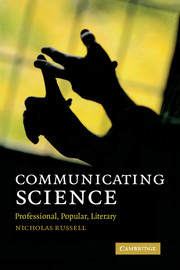Book contents
- Frontmatter
- Contents
- Introduction: What this book is about and why you might want to read it
- Prologue: Three orphans share a common paternity: professional science communication, popular journalism and literary fiction are not as separate as they seem
- Part I Professional science communication
- Part II Science for the public: what science do people need and how might they get it?
- Part III Popular science communication: the press and broadcasting
- Part IV The origins of science in cultural context: five historic dramas
- 15 A terrible storm in Wittenberg: natural knowledge through sorcery and evil
- 16 A terrible storm in the Mediterranean: controlling nature with white magic and religion
- 17 Thieving magpies: the subtle art of false projecting
- 18 Foolish virtuosi: natural philosophy emerges as a discipline but many cannot take it seriously
- 19 Is scientific knowledge ‘true’ or should it just be ‘truthfully’ deployed?
- Part V Science in literature
- Index
- References
18 - Foolish virtuosi: natural philosophy emerges as a discipline but many cannot take it seriously
Published online by Cambridge University Press: 02 December 2010
- Frontmatter
- Contents
- Introduction: What this book is about and why you might want to read it
- Prologue: Three orphans share a common paternity: professional science communication, popular journalism and literary fiction are not as separate as they seem
- Part I Professional science communication
- Part II Science for the public: what science do people need and how might they get it?
- Part III Popular science communication: the press and broadcasting
- Part IV The origins of science in cultural context: five historic dramas
- 15 A terrible storm in Wittenberg: natural knowledge through sorcery and evil
- 16 A terrible storm in the Mediterranean: controlling nature with white magic and religion
- 17 Thieving magpies: the subtle art of false projecting
- 18 Foolish virtuosi: natural philosophy emerges as a discipline but many cannot take it seriously
- 19 Is scientific knowledge ‘true’ or should it just be ‘truthfully’ deployed?
- Part V Science in literature
- Index
- References
Summary
The virtuoso, Sir Nicholas Gimcrack, in Thomas Shadwell's 1676 play of the same name, is an avid student of vermin, spending huge sums on microscopes to examine them and too obsessed with his philosophical investigations to notice that his wife is unfaithful to him. He is learning to swim by imitating frogs, although he does not himself want to swim; imitating motions on land is enough. In a pivotal scene he is discovered lying on a table, attached to a swimming frog in a tank by a thread between his teeth, copying the frog's movements, his style judged by a swimming master.
Gimcrack describes blood transfusions between breeds of dog and between sheep and man, claiming in the first case that this exchanged the breeds, in the second that the human became sheep-like (though others suggest the experiments were all fatal). He is gullible and pays huge sums for eggs in which hairs have miraculously appeared (not noticing the needle holes in the shells). He keeps barrels of air collected from different locations, which he releases into his room, claiming that this is more refreshing than walking in the real places. He has pneumatic engines to create vacuums with which he investigates luminescence in glow-worms and rotting meat, while with his telescopes he claims to see architecture, animals and battles on the moon. […]
- Type
- Chapter
- Information
- Communicating ScienceProfessional, Popular, Literary, pp. 227 - 236Publisher: Cambridge University PressPrint publication year: 2009



